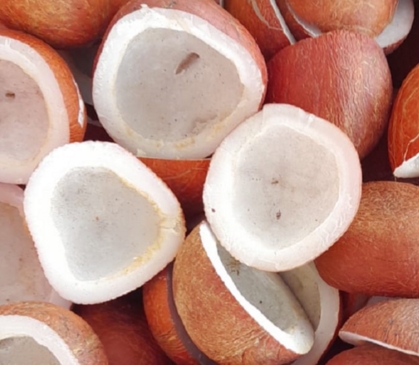- Phone: +91- 7618366095
- Email: sales@romantroops.com
Coconut Copra
Coconuts are big, round fruits that grow on tall palm trees in warm places. They have a hard, brown shell inside, which protects the white, tasty flesh and refreshing water.
Uses of Coconuts:
- Eating and Drinking: The soft white cream can be eaten fresh or dried, and the water inside is a natural, sweet drink.
- Cooking: Coconut is used to make coconut milk and oil, which add great taste to many dishes.
- Household Items: The tree and shell are used to make ropes, mats, and even roofs.
Coconut oil, derived from the meat of coconuts, offers several health benefits:
- Boosts Immunity: Helps the body fight viruses, bacteria, fungi, and parasites.
- Aids Digestion: Enhances nutrient absorption and supports gut health.
- Regulates Blood Sugar: Improves insulin secretion and helps manage diabetes symptoms.
- Supports Thyroid Health: Aids in maintaining proper thyroid function.
- Protects Kidneys & Bladder: Reduces the risk of kidney disease and bladder infections.
- Promotes Weight Loss: Helps in burning fat and managing a healthy weight.
Coconuts are called the “tree of life” because they provide food, drink, and materials for daily use.

| Coconuts Type | Husked, Semi – Husked |
| Color | Light brown, Green |
| Packing Type | 25nuts Per bag |
| Nut Size | 12 to 13 inches (400 – 600grm) |
| Loading Capacity | 900 bags in one 20f container |
Coconut Shell
Coconut shells are the hard, brown outer covering of coconuts. Instead of throwing them away, people use them in many helpful ways.
How Coconut Shells Are Used:
- For Fire & Charcoal: Coconut shells burn well and are used as fuel or to make charcoal.
- For Cleaning: Processed shells turn into activated carbon, which helps clean water and air.
- For Decoration: Artists use them to make bowls, buttons, and crafts.
- For Music: Some musical instruments are made from coconut shells.
- For Fun Sounds: Knocking two shells together sounds like horse hooves in plays.
- For Medicine: Heated shells release oil that can help with tooth pain.
Coconut shells are useful, natural, and great for the environment!
Coconut Copra
Coconut copra is the dried inner white flesh of the coconut. It is mainly used to extract coconut oil and has many other benefits.
Uses of Coconut Copra:
- Oil Production: Copra is pressed to extract coconut oil, which is used for cooking, skincare, and hair care.
- Animal Feed: After oil extraction, the leftover cake is used as nutritious animal feed.
- Food Ingredient: Dried copra is used in sweets, snacks, and traditional dishes.
- Soap & Cosmetics: Coconut oil from copra is used to make soaps, lotions, and beauty products.
- Health Benefits: Rich in healthy fats, copra helps boost energy and supports overall well-being.
Coconut copra is a valuable product with multiple uses in food, health, and industry!
Desiccated Coconut Powder
Desiccated coconut powder is made from high-quality, fully matured coconuts with a fat content of 65%–68%. The coconuts are finely ground using advanced machines to produce a rich, high-fat powder. It is processed under strict hygiene conditions using modern drying techniques to preserve the natural aroma and taste of fresh coconuts.
Packaging Options:
- 5kg Pack
- 25kg Pack
Uses of Desiccated Coconut Powder:
- Used in chutneys, curries, snacks, sweets, cakes, and home cooking.
- Mix with equal parts of water, stir, and squeeze to make coconut milk.
- A flavoring ingredient in biscuits, baked goods, and confectionery.
This finely processed coconut powder adds rich taste and texture to a variety of dishes!
Coir Fiber
It is commonly known as coconut fiber, is a natural material extracted from the outer husk of coconuts. This resilient and versatile fiber has been utilized for centuries in various applications.
Key Characteristics:
- Durability: Coir fibers are notably strong and resistant to wear, making them ideal for products that require longevity.
- Water Resistance: They possess a natural resistance to moisture and saltwater, enhancing their suitability for specific uses.
Common Uses:
- Mats and Rugs: Coir is widely used to manufacture floor mats, doormats, and rugs, valued for its durability and coarse texture.
- Brushes: The stiff nature of coir fibers makes them suitable for producing various types of brushes.
- Mattresses and Upholstery: Coir serves as a filling material in mattresses and upholstery, offering firm support and resilience.
- Ropes and Cordage: Its strength and water-resistant properties make coir an excellent choice for ropes and fishing nets.
- Horticulture: In gardening and agriculture, coir is used as a natural growing medium, promoting healthy plant development.
India and Sri Lanka are leading producers of coir fiber, contributing significantly to the global supply. The eco-friendly nature and versatility of coir fiber make it a valuable resource in various applications worldwide.
